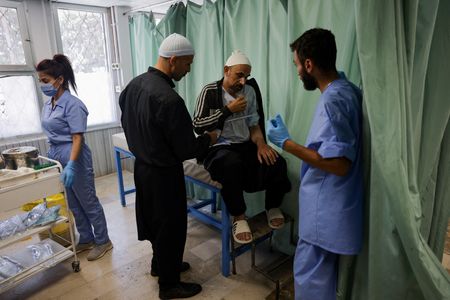PARIS (Reuters) -France’s highest court ruled on Friday that an arrest warrant for former Syrian leader Bashar al-Assad was invalid as it was issued when he was still in office, but said a new warrant can now be issued as he is no longer a sitting head of state.
French investigating magistrates issued the warrant in November 2023 following a French investigation into chemical weapons attacks in the Syrian city of Douma and Eastern Ghouta district in August 2013 that killed more than 1,000 people.
Then-President Assad’s government denied using chemical weapons during the country’s civil war that began in 2011. Assad was toppled last December by Islamist rebels whose leader is now the interim president.
The Court of Cassation’s decision overturns one made by the Paris Court of Appeal, which ruled last year that the warrant was valid. Prosecutors, who would need to ask police to carry out the warrant, challenged its validity.
“International custom does not allow any exception to the personal immunity of a foreign head of state during the entire duration of their term in office, even when the alleged acts constitute genocide, war crimes, or crimes against humanity,” the Court of Cassation said in a statement.
“The arrest warrant issued at a time when this person was the head of state of Syria is therefore invalid … However, an arrest warrant for war crimes and crimes against humanity can now be issued since this person no longer holds the position of Head of State.”
‘MISSED OPPORTUNITY’
Mariana Pena, senior legal officer at Open Society Justice Initiative which helped gather evidence against Assad, described the court’s ruling as “a missed opportunity for justice.”
But she said the fact that France’s top court had agreed to hear the case signalled a growing willingness to challenge immunity. This, she said, was also reflected in “today’s decision which leaves the door open to the prosecution of Assad” now that he is no longer in office.
Separately, French officials issued a warrant in January against Assad for suspected complicity in war crimes, notably the launch of a deliberate attack on civilians, as part of a inquiry into the case of Salah Abou Nabour, a Franco-Syrian national, who was killed in 2017 in a bombing strike in Syria.
Assad fled to Russia in December 2024 when insurgent forces swept through the country in a rapid offensive, ending over 50 years of rule by his family.
While arrest warrants against sitting heads of state are rare due to immunity protection, international law has exceptions when that leader is accused of war crimes, crimes against humanity or genocide. France allows the filing of crimes against humanity cases in its courts.
(Reporting by Benoit Van Overstraeten, Charlotte Van Campenhout, Writing by Makini Brice; Editing by Mark Heinrich and Timothy Heritage)










